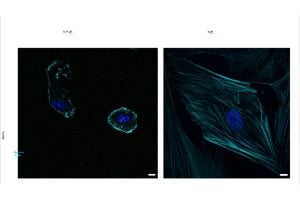Konstantinos Konstantopoulos, the inaugural William H. Schwarz Professor, is known for his research at the intersection of engineering, biology, and medicine with applications in cancer metastasis. He is a professor of chemical and biomolecular engineering.
Konstantopoulos’ group works to elucidate how vascular and tissue microenvironments regulate the dissemination of cancerous cells from a primary tumor to distant organs throughout the body during the process of metastasis. The ultimate goal of his work is to develop novel diagnostic and prognostic tools to predict the likely course of cancer progression and patient outcomes, as well as to design therapeutic strategies to combat cancer metastasis using a directed multidisciplinary approach.
Konstantopoulos’ research is unique and at the forefront of innovation because it integrates novel bioengineering tools with quantitative biophysical models and cutting-edge biochemistry and molecular cell biology techniques for both basic science and translational research. To date, he has pioneered the identification and biophysical characterization of novel adhesion molecules preferentially expressed by tumor cells which facilitate their metastatic dissemination in the body. He also discovered a new mechanism—osmotic engine model—which is employed by tumor cells during their metastatic spread. These basic science discoveries have shed light into previously unknown mechanisms utilized by tumor cells during metastasis and open new avenues to combat this deadly disease.
From a translational perspective, the Konstantopoulos lab has developed a Microfluidic Invasion Network Device (MIND) for diagnosis, prognosis, and precision care of cancer patients. Because of the current inability to accurately predict the metastatic potential of primary tumors, some patients may be overtreated while others receive inadequate treatment. MIND has the potential to be used as a companion assay for clinical prediction of metastasis and selection of effective, individualized therapeutic regimens.
Konstantopoulos served as chair of the chemical and biomolecular engineering department from 2008 to 2017. He is a project leader with the NCI-funded Johns Hopkins Physical Sciences-Oncology Center (2009-present), and principal investigator of four R01 grants supported by the NIH. He was elected Fellow of the American Institute for Medical and Biological Engineering in 2009 and of the Biomedical Engineering Society in 2012. He serves on the editorial boards of The American Journal of Physiology Cell Physiology (2005-present), Technology (2013-present), and Annual Review of Biomedical Engineering (2013-present), and serves as a section editor of Current Opinion in Chemical Engineering and as associate editor of the Annals of Biomedical Engineering (2009-present). He served as chair of the Bioengineering Technology and Surgical Sciences (BTSS) study section of the National Institutes of Health (2011-2013). He has received the Robert B. Pond, Sr. Excellence in Teaching Award (2003 and 2011) and the Bioengineering Distinguished Alumnus Award from Rice University (2013).
Konstantopoulos earned his Diploma of Chemical Engineering from the National Technical University of Athens in 1989 and his PhD in chemical engineering from Rice University in 1995.



